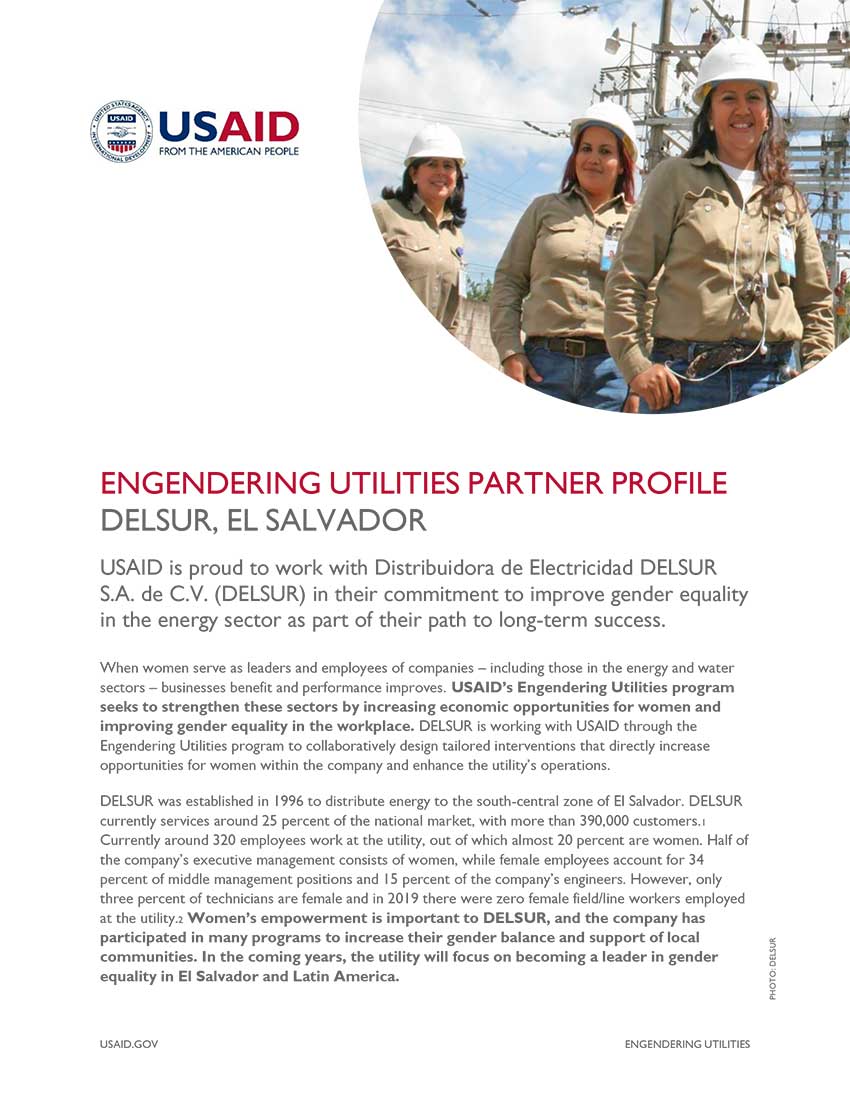- Energy Home
- How We Work
- Programs & Initiatives
- Smart Utilities
- Asia EDGE
- Auction Design Support to Colombia
- Energy Auctions for Kazakhstan’s Green Economy
- Energy Efficiency for Development
- Engendering Utilities
- About
- Business Case
- Approach
- Partners
- OSHEE, Albania
- SONABEL, Burkina Faso
- EDESUR, Dominican Republic
- DELSUR, El Salvador
- EEU, Ethiopia
- Energo-Pro, Georgia
- GRIDCo, Ghana
- BRPL, India
- TPDDL, India
- EDCO, Jordan
- IDECO, Jordan
- Miyahuna, Jordan
- KenGen, Kenya
- Kenya Power
- KOSTT, Kosovo
- LEC, Lesotho
- LEC, Liberia
- EGENCO, Malawi
- EDM, Mozambique
- EKEDC, Nigeria
- IBEDC, Nigeria
- ISWSC, Nigeria
- EVN, North Macedonia
- LASURECO, Philippines
- ZCWD, Philippines
- REG, Rwanda
- OFOR, Senegal
- Senelec, Senegal
- EVN, Vietnam
- Resources
- Stories
- Institutional Framework for Auctions in Mexico
- Powering Agriculture
- The USAID-NREL Partnership
- Scaling Up Renewable Energy
- EmPOWERing Women and Girls
- Competitive Energy Procurement
- Toolkits
- Monitoring & Evaluation
- Resources
- Stories
Speeches Shim
Engendering Utilities Partner Profile
One of 18 distribution companies in El Salvador, DELSUR services 25 percent of the national market with a workforce that is 20 percent female. USAID is proud to work with DELSUR in their commitment to improve gender equality in the energy sector as part of their path to long-term success.
El Salvador restructured its energy sector in 1996, with the formation of new market entities and the unbundling of generation, transmission, distribution and commercialization. The country currently has 18 generation companies and eight distribution companies, with a single government-owned transmission company responsible for the maintenance and expansion of the transmission system.
El Salvador’s male-dominated energy sector mirrors the country’s overall labor participation rates. According to the International Labour Organization, only 47 percent of women participate in El Salvador’s labor market. Of the women who are not participating in the workforce, seven out of 10 cite domestic work and safety concerns as reasons for their inactivity. Safety concerns are warranted, as the rate of violent crime against women in El Salvador is now the third-highest in the world.
Women’s empowerment is important to DELSUR, and the company has participated in many programs to increase their gender balance and support of local communities. USAID is partnering with DELSUR through the Engendering Utilities program to assess and identify high-impact interventions that can improve gender equality within the organization. Through Engendering Utilities, USAID is providing tailored coaching to DELSUR staff on gender equality and business best practices, and select utility personnel are participating in the Gender Equity Executive Leadership Program in collaboration with Georgetown University.
A dedicated change management coach provided by the Engendering Utilities program is working with DELSUR to identify opportunities to address perceptions around obstacles women face in career advancement, including their comfort level with technical jobs. Through this coaching, the utility will develop a tailored action plan to best fit their needs. DELSUR will also place a strong emphasis on engaging influential male leaders as champions of gender equality.


Comment
Make a general inquiry or suggest an improvement.